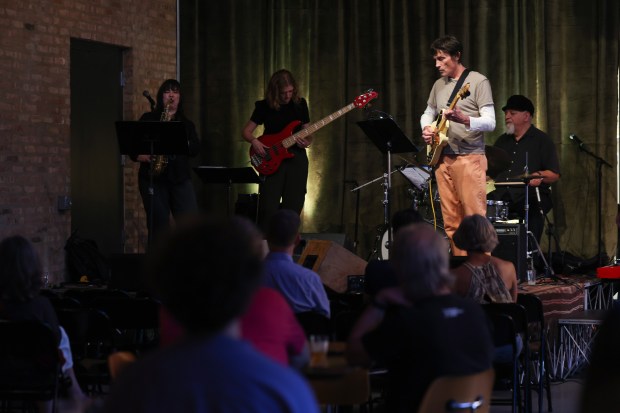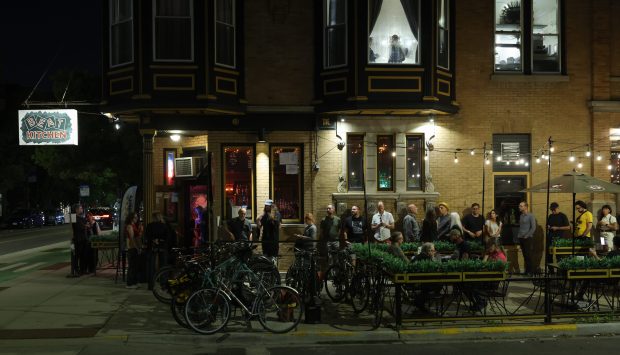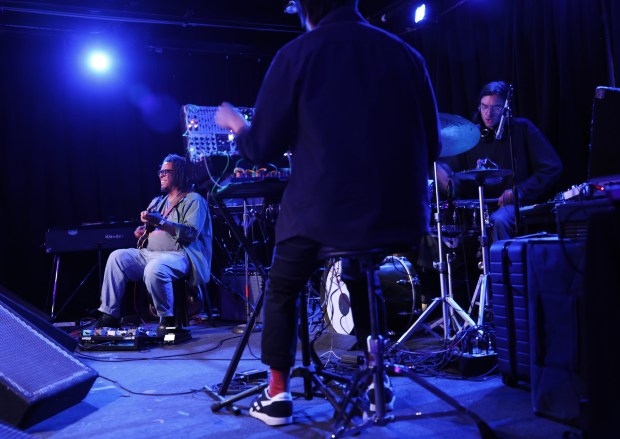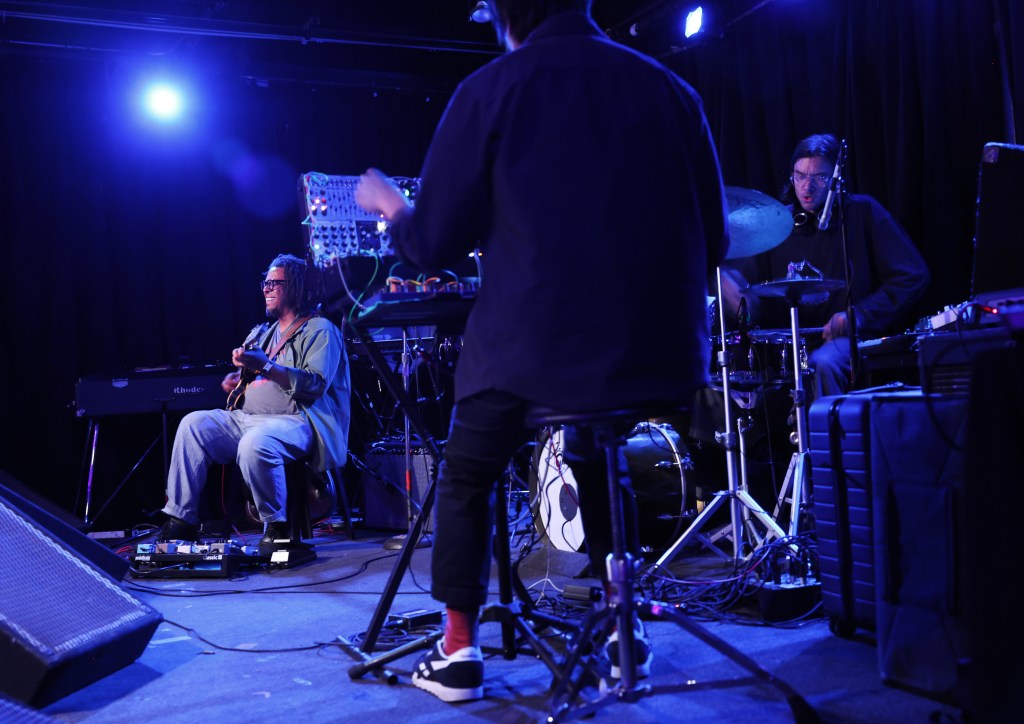Harpist Mary Lattimore had some thank-yous to make. Onstage at an event space in the Rockwell on the River complex, on the cusp of Lake View and Avondale, she paused her delicately looping set to shout out the organizers of Sound & Gravity, the festival she was appearing under. They’d even helped transport her harp.
“I feel very taken care of,” she told the audience, smiling ear-to-ear.
That’s the perk of headlining a festival — by musicians, for musicians — like Sound & Gravity. Earlier this year, Pitchfork co-founder and drummer Mike Reed set to work planning a new music festival that would champion Chicago, and the liminal patch of Chicago that houses his two venues, Constellation and Hungry Brain.
His considerations were logistical as much as creative: Condé Nast had abruptly pulled the plug on Pitchfork, the music festival he helped start in 2005, and many Chicago musicians had long counted on working the festival for some extra cash. Sound & Gravity would get them work — not only as support staff but featured talent — while doubling as a fundraiser for his venues.
The festival, whose inaugural edition ran Sept. 10-14, leaned on the new Rockwell on the River complex at Belmont Avenue and the Chicago River to augment its stages. On Sept. 12, its busiest night, four different stages in the complex — an event space, the patio, distiller Judson & Moore and co-working space Guild Row — became festival stages, as well as local venues Constellation, Hungry Brain, and Beat Kitchen. Like other summer megafests, one could enter all of them freely via a bracelet ticket.
Pithily summarizing what kind of music Sound & Gravity puts on is more or less impossible — though, as Reed said in recent weeks, the tagline of British music publication The Wire, “Adventures in Modern Music,” comes close. It encompassed the polyrhythmic rock of Nigerien singer/guitarist Mdou Moctar, the synth-driven ballads of singer-songwriter Helado Negro, and acts securely rooted in the jazz world — like Amaryllis, a super-stacked sextet led by guitarist Mary Halvorson.
 Hannah Cohen performs at Rockwell on the River during the Sound & Gravity music festival on Sept. 12, 2025, in Chicago. (John J. Kim/Chicago Tribune)
Hannah Cohen performs at Rockwell on the River during the Sound & Gravity music festival on Sept. 12, 2025, in Chicago. (John J. Kim/Chicago Tribune)
 Michael Zerang’s Puzzle House performs at Judson & Moore during the Sound & Gravity music festival, Sept. 12, 2025, in Chicago. (John J. Kim/Chicago Tribune)
Michael Zerang’s Puzzle House performs at Judson & Moore during the Sound & Gravity music festival, Sept. 12, 2025, in Chicago. (John J. Kim/Chicago Tribune)
Still, some trends emerged. Reed seems to have leaned on his drumstick-wielding network for this first go: Third Coast Percussion, Wilco drummer Glenn Kotche (both Sept. 11), Michael Zerang’s Puzzle House (Sept. 12) and percussionist Eli Kessler (Sept. 14) were all among the acts. If not the focus, sometimes drummers were the connective tissue between acts. Kotche appeared in both a solo set and a show with Saccata, his new quartet, and on Sept. 11, drummer Jason Nazary played as part of both Helado Negro’s band and saxophonist Darius Jones’ trio.
Niche as it may be compared to Pitchfork, Sound & Gravity drew a huge, and hugely eager, crowd over its five-day span. A tally provided by the festival counted more than 5,000 attendees, with ticket buyers from 34 states and 5 countries. It sold out entirely on Friday and Saturday, and some gigs hit capacity, like guitarist Jeff Parker’s trance-like Expansion Trio at Beat Kitchen (Sept. 12).
 Festival attendees wait in line to hear Jeff Parker Expansion Trio perform at Beat Kitchen during the Sound & Gravity music festival, Sept. 12, 2025, in Chicago. (John J. Kim/Chicago Tribune)
Festival attendees wait in line to hear Jeff Parker Expansion Trio perform at Beat Kitchen during the Sound & Gravity music festival, Sept. 12, 2025, in Chicago. (John J. Kim/Chicago Tribune)
 Jeff Parker, from left, Jeremiah Chiu and Ben Lumsdaine of Jeff Parker Expansion Trio perform at Beat Kitchen during the Sound & Gravity music festival, Sept. 12, 2024, in Chicago. (John J. Kim/Chicago Tribune)
Jeff Parker, from left, Jeremiah Chiu and Ben Lumsdaine of Jeff Parker Expansion Trio perform at Beat Kitchen during the Sound & Gravity music festival, Sept. 12, 2024, in Chicago. (John J. Kim/Chicago Tribune)
For the most part, though, Sound & Gravity’s stylistic range helped keep attendees spread out across the seven venues. And like any music festival worth its salt, it snuck in some surprise acts, posted up at Hungry Brain on the last day: avant-rock duo Finom and The Big Gig, Reed’s own band.
My biggest gripe with Sound & Gravity Vol. 1 boiled down to scheduling. Of course, the perverse beauty of a music festival is that it’s usually impossible to hear everything at it. But booking its two furthest venues — Beat Kitchen to the east, the Rockwell on the River complex to the west — on the same festival slots two days in a row was an especially cruel stroke. Had those shows been staggered, one could harbor some hope that slipping out of one venue for the other would be worth the shlep.
As it was, one had to consign themselves to being anchored at either Rockwell on the River or the Constellation/ Hungry Brain / Beat Kitchen axis. Otherwise, too much precious time was lost commuting: The walk from Beat Kitchen to the Rockwell complex takes just under 20 minutes. For all Sound & Gravity’s boasts of walkability, that’s not exactly an easy jaunt—and the Belmont bus isn’t frequent enough to plan your movement around, either. Those plotting a particularly antic path through the festival without a bike or car will probably get pooped by Act 3.
With Sound & Gravity, the co-founder of the Pitchfork Festival declares he isn’t done yet
Festival organizers will have to mull over all of this going forward, despite a charmed first outing. Anything less than last week’s gorgeous weather, and the whole enterprise might have floundered.
But the perfection of the week also gave it a frozen-in-amber quality. After hearing Kotche’s set at Constellation — a personal highlight for its mix of geniality and virtuoso heat — I made the peaceful walk up Belmont to Beat Kitchen. One section of Kotche’s set was ringing in my ears, from a new work for percussion and electronics he called “The Third Round.” At the end of the tune, the groove dropped away, and Kotche stood to twirl a whirligig-esque instrument above his head — a high, twittering sound. “When I hear what we call music,” a voice said over the loudspeaker, “it seems to me that someone is talking.”
“Adventures in modern music” works, but the freedom to speak, and to be? That’s the best elevator pitch for Sound & Gravity I’ve heard yet.
Hannah Edgar is a freelance critic.
The Rubin Institute for Music Criticism helps fund our classical music coverage. The Chicago Tribune maintains editorial control over assignments and content.
